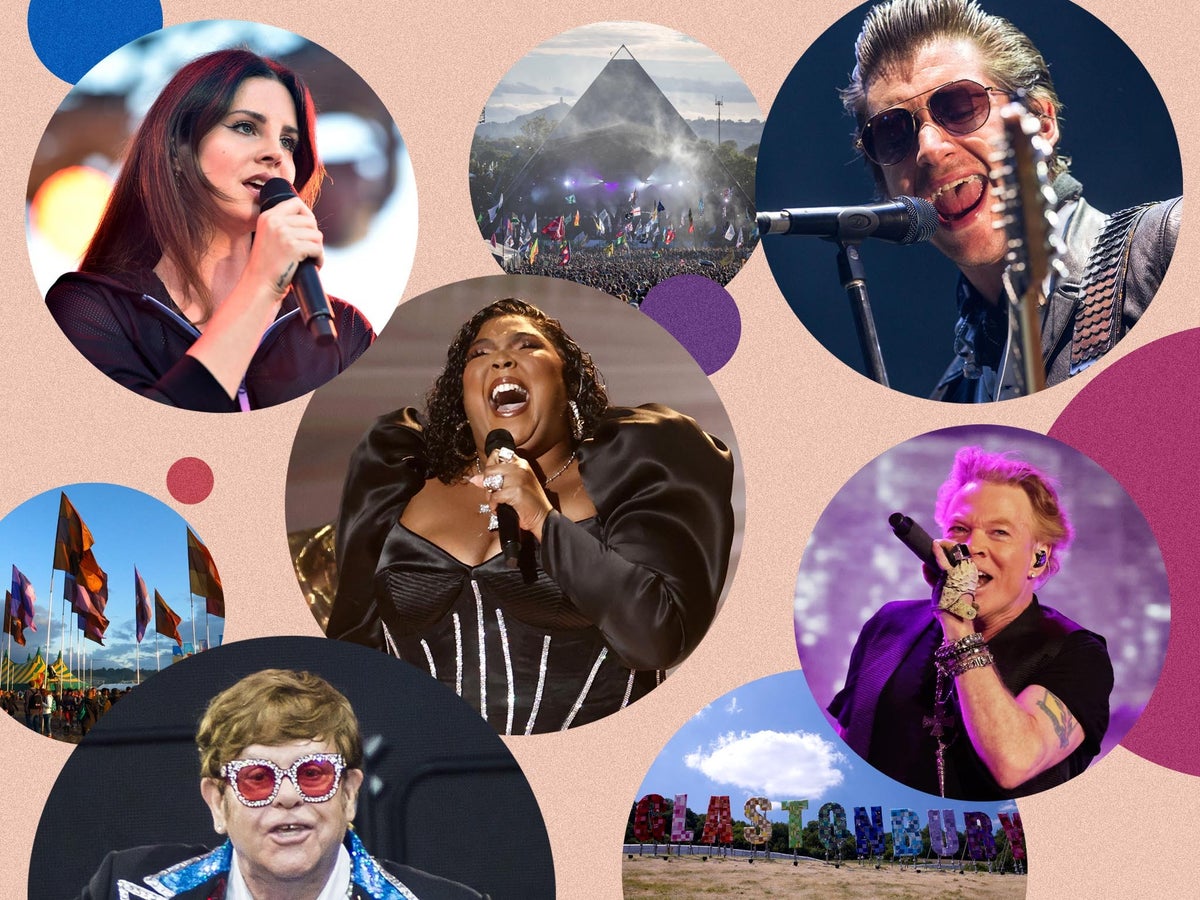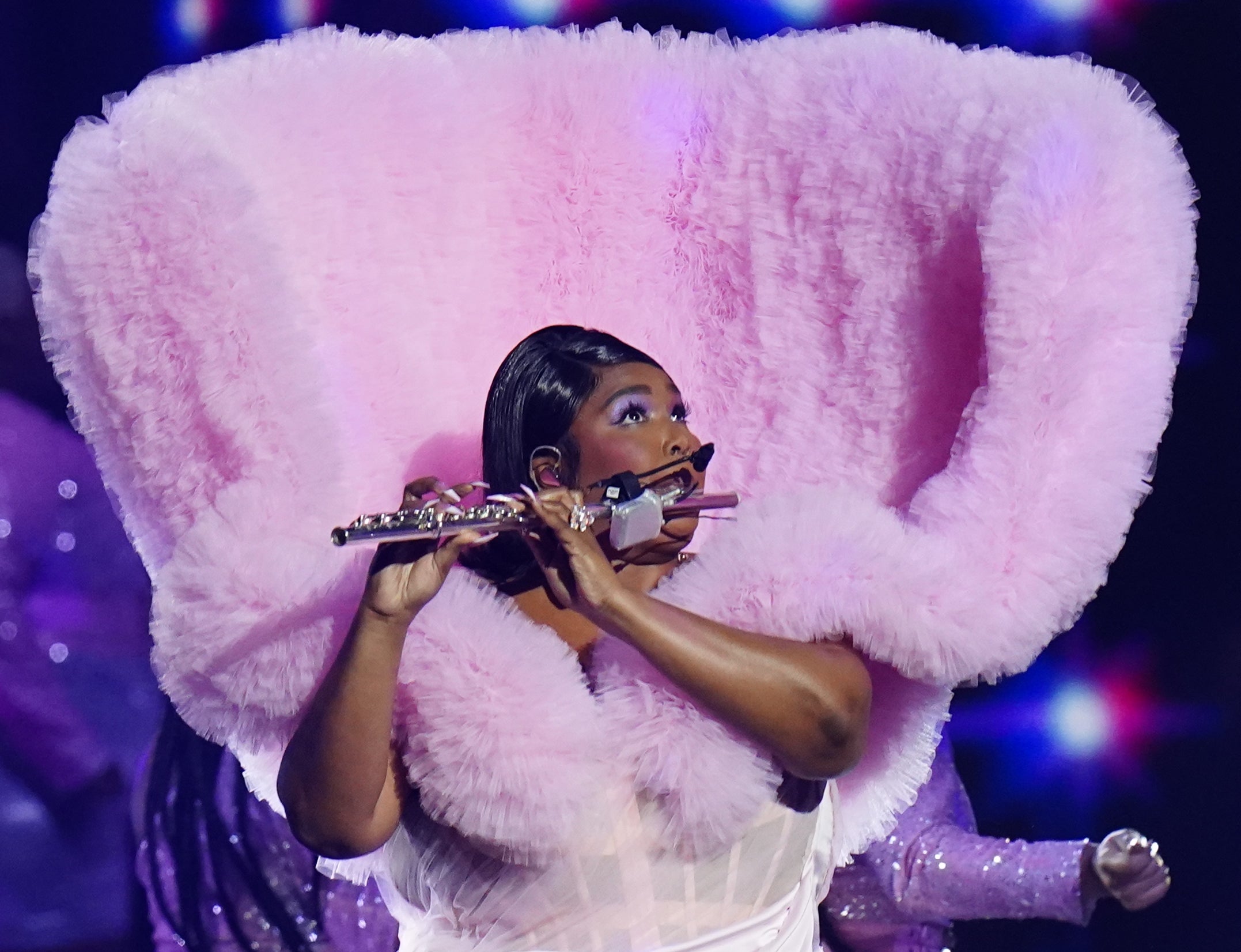
Emily Eavis’s latest Glastonbury headliner announcement felt like an apology. Usually, organisers have fun by hiding clues near Worthy Farm – a poster in a charity shop window revealing Stormzy’s Pyramid Stage slot in 2019, for instance, or a mysterious “crop circle” for Radiohead in 2017. This time, though, Eavis’s announcement was made via a discussion about the fact that 2023’s headliners are male, all-white, all over again. Guns N’ Roses, Arctic Monkeys, Elton John.
As the news broke, music fans on social media swiftly began questioning why Lana Del Rey or Lizzo weren’t headlining over one of the current trio. “[Lizzo] could totally headline,” Eavis said of the Grammy-winning artist, who is playing two shows at London’s O2 Arena this month. “Many of the artists could. But the headline slot had already been promised to someone else.”
Lizzo would be a superb headliner. At the Brit Awards (which had its own representation controversy), she put on the performance of the night with an energetic medley of “Special”, “2 Be Loved (Am I Ready)” and “About Damn Time”. Lana Del Rey might not have the “hits” to sustain a full headline set, but she’s a beguiling live artist in her own way, channelling a dreamy, old Hollywood mystique. She also has a devoted (some might say obsessive) fanbase, and seven Billboard top 10 albums under her belt. Having both of them as “support” for Glastonbury’s 2023 headliners feels a lot like a consolation prize. It’s also indicative of a looming industry catastrophe.
While 48 per cent of the 54 names on this week’s lineup announcement (many more are yet to be announced) are female, it is clear Eavis has endured an uphill battle to come as close as possible to her pledge for gender parity. You can practically hear the weariness in Eavis’s voice, as she calls the struggle to book enough female artists a “pipeline” issue. “This starts way back with the record companies, radio,” she told The Guardian. “I can shout as loud as I like but we need to get everyone on board.”
Indeed, a number of industry figures have been shouting loudly for the industry to get its act together for years. It’s eight years since the Keychange initiative was launched by former PRS Foundation CEO Vanessa Reed in 2017, with a bid to fulfil a 50-50 gender balance across festival line-ups and conferences by 2022. Since then, the industry has gone through Brexit and a pandemic, leaving venues, festivals and record labels scrambling to get back on track amid an increasingly competitive global market.
A symptom of this, it appears, is that festival bookers are resorting to old, bad habits in a bid to lure music fans back to the events they’ve gone without for the last few years. In 2022, a YouGov survey found that only one in 10 headliners at the UK’s top festivals were women. Of 200 headline acts, just 26 were female, one identified as non-binary, 24 had a mixed line-up, and the rest (149) were either male solo artists or all-male bands.
But, as Eavis points out, the issue begins far earlier than festival line-ups. Record labels seem perfectly content to sign 100 identikit white male singer-songwriters – your Ed Sheeran, Lewis Capaldi, George Ezra and Sam Fender soundalikes – and just about every spoken-word band that stumbles out of The Windmill in Brixton. Of course, this isn’t the case for women. “There can only be one Adele, one Dua Lipa,” seems to be the argument. The UK industry is still blighted by the ludicrous view that, if you have one female pop star, it’s impossible to break another one on the same timeline. Meanwhile, in the US, they make it look effortless, with Lana Del Rey and Lizzo doing just fine alongside Lady Gaga, Olivia Rodrigo, Beyoncé, SZA, Taylor Swift, Miley Cyrus, Demi Lovato, Meghan Trainor…

There’s also a lack of effort to help emerging female artists achieve any kind of longevity. Labels are busy snapping up viral TikTok stars with one song and zero live experience to their name, then scratching their heads over why fans feel no sense of loyalty towards them, even as industry giants like Capaldi share memories of one of his first gigs in Scotland (he’s currently on a worldwide arena tour). Success such as his does not happen overnight. Yet even now, publications put out their lists championing 100-plus artists to watch each year then fail to mention half of them ever again. Radio stations play the same major label artists on a never-ending loop. Last year’s gender and racial disparity report into UK radio found that UK male solo artists occupied the top 100 more than three times as often as female solo artists, and were present in 80 per cent of all top 100 singles. Sheeran alone took up 10 per cent of the top 50 singles last year.
If the UK – government, radio, record labels, promoters, media – doesn’t work to address this, it will soon find itself falling far behind. It is not melodramatic to point out the perfect storm of factors that could lead to a full-blown industry crisis. Rishi Sunak wants us all to ditch music and learn algebra instead (“ABCDE FU,” as someone once said). The effects of Brexit are already widely felt in the live music sector, with both new and established artists simply unable to afford to go out on tour. Homegrown festivals will seem like less of a draw when European events have better line-ups and better weather. So the industry needs to get over its tokenistic mentality towards women and accept, finally, that supporting the wealth of talent we have can only benefit everyone.







